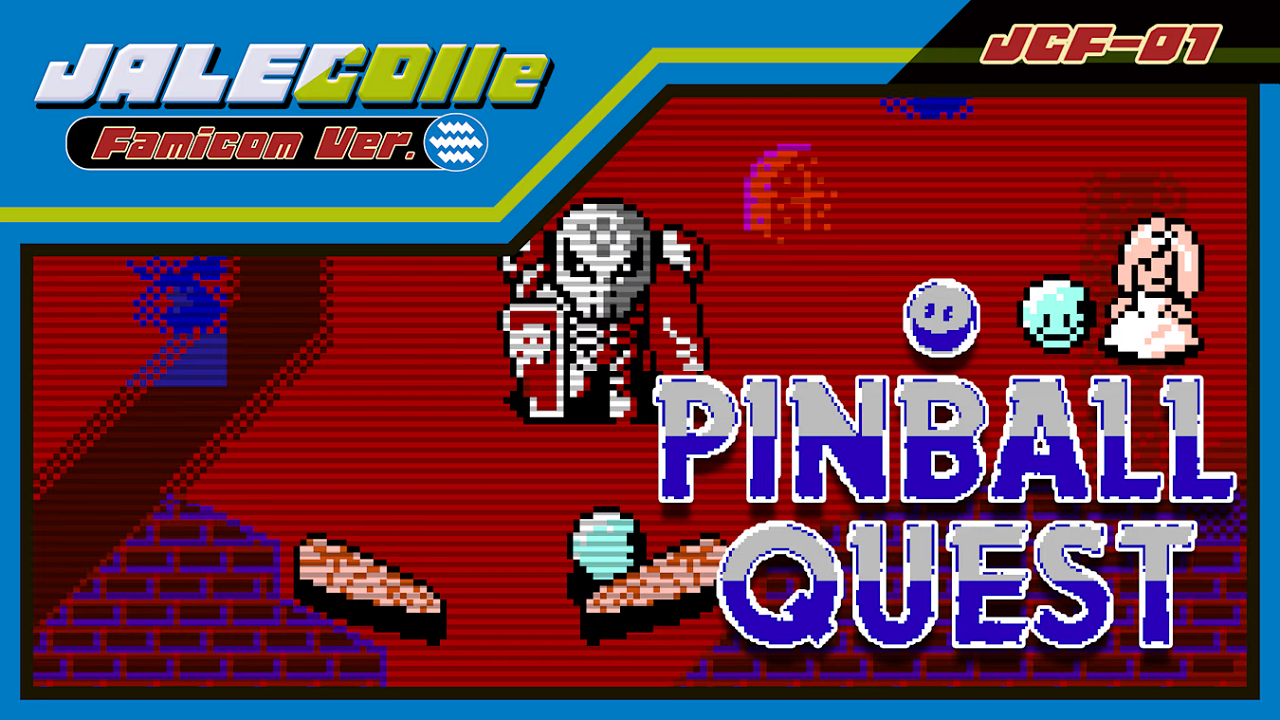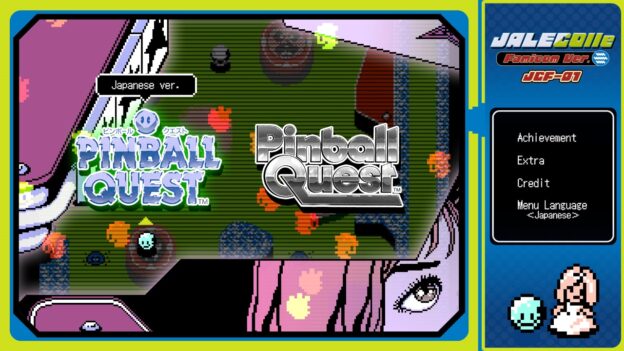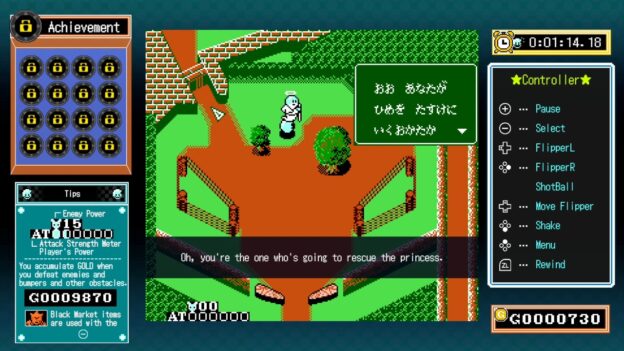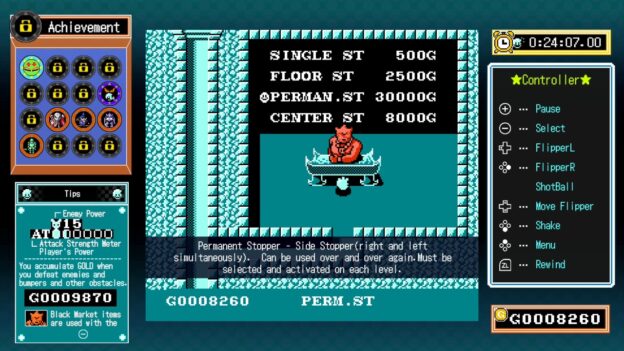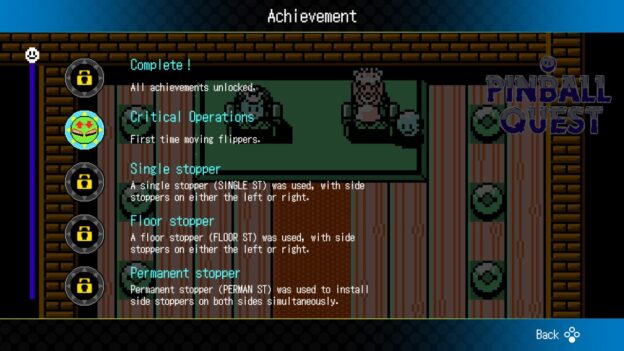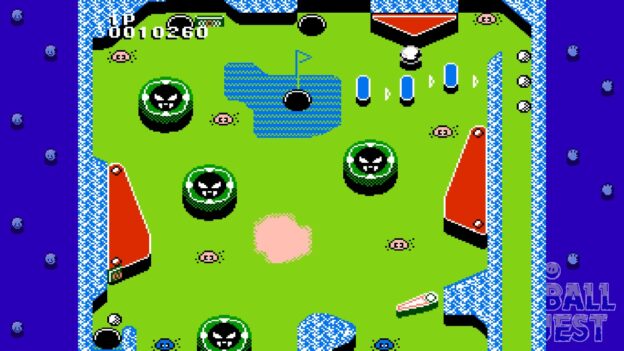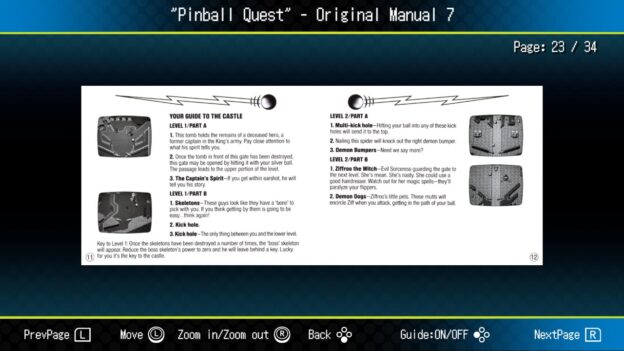This NES game quietly flew beneath the radar onto the Switch last month, and the naming probably played a part. JALECOlle Famicom Ver. Pinball Quest is wordy and confusing. This is Pinball Quest, plain and simple, a game I didn’t expect to move past the 8-bit hardware, but I’m glad it did. It’s made a fun but flawed game much more playable and satisfying.
Pinball Quest compiles four tables: three traditional and one adventurous tall multi-table for the fantasy/RPG “main mode” comprising the Quest portion of the title. So when you break it down that way, $7.99 isn’t bad for a collection of tables. This re-release is also cheaper than an NES cart and manual – a scan of the latter is included, something I appreciate as I’ve only ever had a loose cart.
But it’s all the varied options elevating this game, making the quest much more manageable. Each table corresponds to a portion of the kingdom, and your goal is to get from the castle grounds to the top and save the kidnapped princess. Back in the day, the game made this task borderline NES hard, with a high probability that a ball falling past the flippers would tumble several tables below, sometimes all the way back to start! The concept of respecting players’ time was more foreign (as was balanced difficulty) when this game was first released. It ultimately made playing this mode (and replaying previously beaten tables) frustrating. A padded game that soon ran out of steam.
Now, the game has “Rewind” claimed as a feature for “Beginners.” Trust me when I say it’s also for vets. Though not a perfect solution, it fixes a fundamental design flaw where the original asked more of the player than it gave back. The only recourse on NES was to grind, so you could afford to purchase stoppers from the black market to stay on the table. Rewind is so welcome for if and when 8-bit physics takes its toll. Beyond that, save states fit not just busy lives but also the handheld nature of Switch. So I can pick away at the game here and there and better appreciate what it brings to the table. I can also finally try to beat it less out of my own stubbornness and more because I’m having fun.
Just use moderation for both. To illustrate this point, I don’t rewind if I mess up moving the flippers. In Pinball Quest, as the ball moves up (and back down) the table, you move the flippers in tandem to keep pace. Admittedly, having them not locked in place takes getting used to, as it is so different. But at least if the ball drops with no flippers present, I know it’s my fault outright. Again, Pinball Quest isn’t NES hard in the usual sense, although the game is plenty tough (often for the wrong reasons). These features will especially help with the time commitment needed for potentially highly repetitive tasks and lessen the need for (lacking a better word) luck.
Strangely, the marketing for this re-release only briefly mentions the trio of more traditional tables: “Additionally, you can play on three diverse tables: ‘POP! POP!’, ‘VIVA! GOLF,’ and ‘CIRCUS’.” This undersells the game, as these tables are fun in their own right and arguably more so in some respects. While there’s still uniqueness, you’ll notice more familiar elements, like stationary flippers, features similar to other NES pinball games, and a fairer challenge. These tables add real value to the game.
All options aren’t created equally. For every achievement, filter, and wallpaper option, there are “Adventure Hints” and a “Simple Timer.” The former (when played in handheld mode, at least) is virtually useless, as the bulk of screen sizes make them unreadable. The latter sounds fun — “Record Your Best Time” — but the RPG Mode is as much influenced by random chance as it is player skill. It would’ve been considerably better to have local leaderboards for the traditional tables, chasing high scores that rely more on player skills.
The original Pinball Quest mostly succeeded despite itself. Now, players can see its clever ideas less saddled by curious ones. The game is less of a drain and endurance test. While there are better NES pinball games, fans of retro video pinball should find this a fun addition to their Switch library. Pinball Quest is marketed as the first of a series of Jaleco Famicom re-releases. I’m excited to see what follows. Hopefully, more thought is put into features, jettisoning some unimportant ones for those that better enhance the games.
Review: JALECOlle Famicom Ver. Pinball Quest (Nintendo Switch)
Good
The original Pinball Quest mostly succeeded despite itself. Now, players can see its clever ideas less saddled by curious ones. The game is less of a drain and endurance test. While there are better NES pinball games, fans of retro video pinball should find this a fun addition to their Switch library. Pinball Quest is marketed as the first of a series of Jaleco Famicom re-releases. I’m excited to see what follows. Hopefully, more thought is put into features, jettisoning some unimportant ones for those that better enhance the games.

